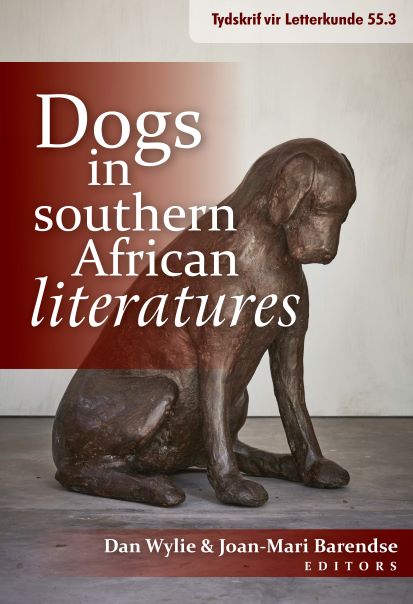“We are all souls”: Dogs, dog-wo/men and borderlands in Coetzee and Tyulkin
DOI:
https://doi.org/10.17159/2309-9070/tvl.v.55i3.5508Keywords:
borderlands, dog-man, heterotopia, marginalityAbstract
Examining the notion of “dog-men” in Coetzee’s Disgrace and Tyulkin’s documentary Not about Dogs, I argue that when the main characters become dog-men and dog-women they share with dogs the status of subaltern border-creatures. I view the spaces in the Eastern Cape and eastern Kazakhstan as borderlands which parallel the mythic lands of Dog-men from White’s anthropological study Myths of the Dog-man. These spaces of human-dog interactions, in turn, relate to Foucauldian heterotopias as sites that establish alternative modes of power relations.
Downloads
References
Attridge, Derek. “Age of Bronze, State of Grace: Music and Dogs in Coetzee’s Disgrace”. Novel: A
Forum on Fiction, vol. 34, no. 1, 2000, pp. 98–121.
Berger, John. The Shape of a Pocket. Bloomsbury, 2001.
Butler, Judith. Frames of War. When is Life Grievable? Versus, 2009.
Coetzee, J.M. The Lives of Animals. Princeton UP, 1999.
Coetzee, J.M. Disgrace. Vintage, 2000.
Cornwell, Gareth. “Disgraceland: History and the Humanities in Frontier Country”. English in Africa,
vol. 30, no. 2, 2003, pp. 43–68.
Coppinger, Raymond and Coppinger, Laura. What is a Dog? Chicago UP, 2016.
Dekoven, Marianne. “Going to the Dogs in Disgrace”. English Literary History, vol. 76, no. 1, 2009,
pp. 847–875.
Deleuze, Gilles and Guattari, Felix. A Thousand Plateaus. U of Minnesota P, 1987.
Derrida, Jacques. Given Time. Counterfeit Money. Trans. P. Kamuf. Chicago UP, Vol. I, 1992.
Easton, Kai. “Coetzee’s Disgrace: Byron in Italy and the Eastern Cape c. 1820”. The Journal of
Commonwealth Literature, vol. 42, no. 3, 2007, pp. 113–130.
Encyclopaedia Judaica. Kefer, 1986.
Garber, Marjorie. “Reflections” in J. M. Coetzee. The Lives of Animals. Princeton UP, 1999, pp. 73–
Figes, Orlando. Natasha’s Dance: A Cultural History of Russia. Allen Lane, 2002.
Foucault, Michel. “Of Other Spaces: Utopias and Heterotopias”. Architecture. October 1984. (“Des
Espace Autres”. March 1967. Transl. by Jay Miscowiec.)
Haraway, Donna. The Companion Species Manifesto: Dogs, People, and Significant Others. Prickly
Paradigm Press, 2003.
Hetherington, Kevin. The Badlands of Modernity: Heterotopia and Social Ordering. Routledge, 1997.
Heron, Tom. “The Dog Man: Becoming Animal in Coetzee’s Disgrace”. Twentieth Century Literature
: 4. 2005. 467–490.
Huggan, Graham and Helen Tiffin. Post-Colonial Ecocriticism: Literature, Animals, Environment.
Routledge, 2010.
Livak, Leonid. The Jewish Persona in the European Imagination. Stanford UP, 2010.
Downloads
Published
Issue
Section
License
Copyright (c) 2018 Tydskrif vir Letterkunde

This work is licensed under a Creative Commons Attribution-ShareAlike 4.0 International License.


 https://orcid.org/0000-0001-6465-6584
https://orcid.org/0000-0001-6465-6584


.png)